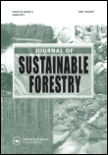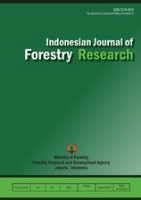
Tropics
Scope & Guideline
Unveiling the secrets of the tropics for future generations.
Introduction
Aims and Scopes
- Tropical Ecology and Biodiversity:
Research on the complex interactions within tropical ecosystems, including species diversity, community dynamics, and ecological processes. - Sustainable Resource Management:
Studies focused on sustainable practices in the utilization of forest resources, particularly non-timber forest products (NTFPs), and their impact on local communities and biodiversity. - Forest Dynamics and Recovery:
Investigations into forest structure, recovery processes after logging, and the ecological implications of different harvesting techniques. - Soil and Nutrient Dynamics:
Research addressing soil health, nutrient cycling, and the effects of fertilization and land-use changes on tropical soils. - Invasive Species and Ecosystem Impact:
Studies on the effects of invasive species on native ecosystems and the management strategies to mitigate their impact. - Microbial Ecology in Tropical Soils:
Exploration of microbial communities in tropical forest soils and their roles in nutrient cycling and ecosystem functioning.
Trending and Emerging
- Impact of Climate Change on Tropical Ecosystems:
Recent publications increasingly address the effects of climate change on biodiversity and forest dynamics, highlighting the importance of understanding these impacts for conservation strategies. - Forest Recovery and Resilience:
There is a growing trend in studying forest recovery processes post-logging, emphasizing the resilience of tropical ecosystems and the factors that promote recovery. - Invasive Species Management:
Research on invasive species has gained momentum, focusing on their ecological impacts and management strategies to protect native biodiversity. - Nutrient Cycling in Managed Ecosystems:
Emerging studies examine the effects of various land management practices on nutrient cycling in tropical soils, indicating a trend towards understanding how management influences ecosystem health. - Community-Based Resource Management:
The focus on community involvement in sustainable resource management practices is increasing, reflecting a shift towards integrating social dimensions with ecological research.
Declining or Waning
- Commercialization of NTFPs:
Although initially a strong focus, recent publications indicate a waning interest in the socioeconomic aspects of NTFP commercialization, possibly due to shifting attention towards ecological impacts and sustainability. - Detailed Taxonomic Studies:
There has been a noticeable decline in papers dedicated to detailed taxonomic studies of specific species, suggesting a shift towards broader ecological and conservation themes. - Traditional Ecological Knowledge:
Research integrating traditional ecological knowledge with scientific approaches appears to be less prominent, possibly overshadowed by more quantitative ecological studies.
Similar Journals

BOIS ET FORETS DES TROPIQUES
Unveiling Insights for Sustainable Forest ManagementBOIS ET FORETS DES TROPIQUES is a distinguished journal published by CIRAD-CENTRE COOPERATION INT RECHERCHE AGRONOMIQUE POUR, based in France. The journal is committed to disseminating high-quality research in the domains of ecology, forestry, and environmental science, reflected by its impressive ranking in multiple Scopus categories, including Q2 in Forestry and Q3 in Ecology. With an ISSN of 0006-579X and an e-ISSN of 1777-5760, BOIS ET FORETS DES TROPIQUES serves as a vital platform for scholars and practitioners to explore and share insights about tropical forests and their ecosystems. Although it operates under a subscription model without open access options, the journal plays a crucial role in advancing research and practices essential for sustainable forest management and biodiversity conservation in tropical regions. Its ongoing publication from 2010 to 2024 ensures a continuous contribution to the academic community, fostering a deeper understanding of ecological dynamics and promoting innovative approaches within the field.

Floresta e Ambiente
Exploring the ecological significance of forests worldwide.Floresta e Ambiente is a pioneering open-access journal dedicated to advancing knowledge in forestry and environmental science, published by the Federal Rural University of Rio de Janeiro's Institute of Forests. Since its inception in 2012, this journal has emerged as a crucial platform for researchers, professionals, and students to disseminate innovative findings and foster discussions on sustainable forest management, conservation practices, and the ecological significance of forests in Brazil and beyond. With an impressive impact factor and a commendable ranking in the SCOPUS database, positioned in the 49th percentile of the Agricultural and Biological Sciences category, Floresta e Ambiente actively supports the dissemination of high-quality research while contributing to the global discourse on forestry. As an open access journal since 2013, it ensures that valuable knowledge is readily available to all, enhancing collaboration and engagement within the scientific community.

Forestist
Innovating ecological research for a greener tomorrow.Forestist, published by AVES, is a pivotal open-access journal dedicated to the field of Forestry, providing a platform for researchers, professionals, and students to explore cutting-edge developments and research within the discipline since 1980. Operating from Turkey, this journal offers a unique opportunity for scholars to share their findings with a broad audience, contributing to the global discourse on sustainable forest management, conservation practices, and ecological research. With an impressive impact factor and a current categorization in the Q3 quartile for 2023, Forestist ranks among the essential resources in Agricultural and Biological Sciences, particularly within the realm of Forestry, as indicated by its Scopus ranking of #119 out of 174 journals. This publication is committed to fostering open access to knowledge, making research freely available while encouraging innovative studies that address the pressing challenges in forestry and environmental science.

Sylwan
Cultivating knowledge for responsible forest stewardship.Sylwan, published by POLSKIE TOWARZYSTWO LESNE, is a key journal in the field of forestry, focusing on the science and practice of sustainable forest management and conservation. Operating since 1979 and releasing issues periodically, including those from 2011 to 2018 and from 2020 to 2024, this journal plays a vital role in disseminating research and advances in forestry practices particularly relevant to Poland and the broader European context. While currently not offering open access options, Sylwan maintains a Q4 ranking in the forestry category according to the Scopus database, highlighting its dedicated niche within the scientific community. The journal serves as an essential resource for researchers, professionals, and students seeking to enhance their understanding of forestry issues in a global and ecological framework. With a commitment to promoting innovative research, Sylwan supports the ongoing dialogue on forestry management and policies, ultimately contributing to the sustainable development of forest resources.

SILVA FENNICA
Fostering Sustainable Practices Through Open Access ResearchSILVA FENNICA, publishing since 1976, is a premier open-access journal dedicated to the advancement of knowledge in the fields of Forestry and Ecological Modeling. Released under the stewardship of the Finnish Society of Forest Science in collaboration with the Natural Resources Institute Finland, this journal serves as a vital resource for researchers, professionals, and students alike, fostering the exchange of innovative ideas and research findings. With an impressive impact factor placed in the Q1 category for Forestry and holding a commendable Q3 position in Ecological Modeling as of 2023, SILVA FENNICA illustrates its significance by ranking 47th in Forestry and 19th in Ecological Modeling according to Scopus metrics, reflecting a robust peer recognition and dissemination of scholarly work. The journal offers open access to all published articles since 1998, ensuring wide visibility and accessibility of research outputs. Located in Finland, SILVA FENNICA invites contributions that address sustainable forestry practices, forest ecology, and ecological modeling with a commitment to promoting scientific discussion and environmental stewardship.

Journal of Sustainable Forestry
Exploring the intersection of ecology and forest management.Journal of Sustainable Forestry is a premier academic publication dedicated to advancing knowledge and practices in the field of sustainable forestry and environmental management. Published by Taylor & Francis Inc in the United Kingdom, this journal has been a cornerstone for researchers and professionals since its inception in 1992. With an impressive reputation, it boasts a 2023 Q2 ranking in Food Science, Forestry, and Geography, Planning and Development, highlighting its significant contribution to interrelated disciplines. The journal’s impact is further underscored by its Scopus ranking, especially in Forestry where it holds the 43rd position out of 174 publications, placing it in the 75th percentile. Although not open access, the journal remains committed to providing innovative research and practical insights into forest management, ecological sustainability, and policy development. As the field of sustainable forestry continues to evolve, the Journal of Sustainable Forestry serves as an essential resource for those committed to advancing sustainable practices globally, fostering a deeper understanding of how sustainable forestry can contribute to environmental resilience and biodiversity conservation.

EUROPEAN JOURNAL OF FOREST RESEARCH
Innovating Solutions for Sustainable Forest ManagementThe European Journal of Forest Research (ISSN: 1612-4669; E-ISSN: 1612-4677), published by Springer, stands at the forefront of advancing the field of forestry and plant sciences. With a distinguished reputation reflected in its Q1 category rankings in both Forestry and Plant Science for 2023, this journal excels in disseminating high-quality research that addresses the critical challenges facing forest ecosystems across Europe and beyond. Established in Germany, the journal has transitioned through various phases since its inception in 1996, striving to integrate innovative research findings that promote sustainable forest management and conservation strategies. As part of a rich academic tradition, it boasts a commendable ranking within the Scopus database, placing it in the top echelons of its category. Researchers and practitioners alike can benefit from its commitment to open access options, ensuring that cutting-edge studies are accessible to a global audience. The European Journal of Forest Research serves as an essential platform for knowledge exchange, aiming to enhance the understanding of forest dynamics and improve the management of forest resources in the face of a changing climate.

BALTIC FORESTRY
Transforming Forestry Through Cutting-Edge ResearchBALTIC FORESTRY, published by the INST FORESTRY LRCAF in Lithuania, is a prominent academic journal that serves as a platform for disseminating cutting-edge research in the field of forestry. With an ISSN of 1392-1355, this journal is dedicated to advancing knowledge on sustainable forest management, ecological impacts, and resource conservation, among other vital topics. As of 2023, it has been categorized in the Q3 quartile for forestry in Scopus, indicating its solid reputation among peer-reviewed publications, ranking #95 out of 174 in the realm of Agricultural and Biological Sciences. BALTIC FORESTRY features contributions from researchers across the globe and encourages innovative approaches to solving contemporary challenges in forestry, making it an essential resource for professionals, scholars, and students alike. Although it operates under subscription-based access options, the journal's commitment to fostering academic discourse is unwavering, aiming to bridge the gap between theory and practice in forest science.

Indonesian Journal of Forestry Research
Exploring the future of forestry and environmental management.The Indonesian Journal of Forestry Research is a distinguished, peer-reviewed academic journal published by the Ministry of Environment & Forestry of Indonesia. With an ISSN of 2355-7079 and E-ISSN 2406-8195, this journal has been an Open Access platform since 2014, fostering international collaboration and knowledge sharing in the fields of ecology and forestry. As of 2023, the journal holds a respectable Q3 category in both Ecology and Forestry, reflecting its contribution to the science community. It ranks #99/174 in Forestry and #305/461 in Ecology in Scopus, indicating its growing influence in the respective fields. Aimed at researchers, professionals, and students, the Indonesian Journal of Forestry Research provides vital insights and findings, supporting sustainable forestry practices and environmental management in Indonesia and beyond. With an emphasis on innovative methodologies and applied research, this journal stands as a pivotal resource for those dedicated to advancing forestry science and ecological research.

Revista Forestal Mesoamerica Kuru-RFMK
Fostering collaboration for forest health and biodiversity.Revista Forestal Mesoamerica Kuru-RFMK is a vital academic platform dedicated to the advancement of forest science and management within the Mesoamerican region. Published by the Instituto Tecnológico de Costa Rica, this journal has been an Open Access resource since 2011, ensuring that critical research is accessible to a global audience. With an ISSN of 2215-2504, it aims to foster collaboration and knowledge exchange among researchers, professionals, and students eager to address the pressing challenges facing forests in Central America. The journal prioritizes interdisciplinary studies related to forest ecology, conservation, and sustainable management practices, making it an indispensable reference for anyone interested in enhancing forest health and biodiversity. By contributing to this resource, scholars can impact policy and practice while enriching the academic community’s understanding of Mesoamerica's unique forest ecosystems.